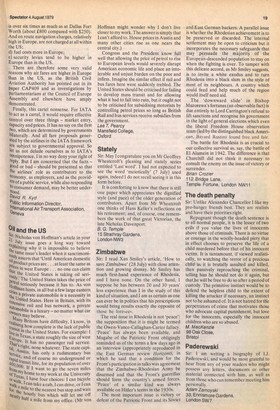Zimbabwe
Sir: I read Xan Smiley's article, 'How to save Zimbabwe' (28 July) with close attention and growing dismay. Mr Smiley has much first-hand experience of Rhodesia, and I have none. On the other hand, I suppose he has between 20 and 30 years' less experience than I in the study of this kind of situation, and I am as certain as one can ever be in politics that his prescriptions would bring results exactly the opposite of those he foresees.
The real issue in Rhodesia is not 'peace': the supposition that it is might be termed the Owen-Vance-Callaghan-Carter fallacy. 'Peace' has always been available, and Mugabe of the Patriotic Front obligingly reminded us of the terms a few days ago in an interview (appropriately reproduced in the East German review Horizon), in which he said that a condition for the Front's participation in talks was agreement that the Zimbabwe-Rhodesian Army be disarmed and that the Front's guerrillas should form the country's armed forces. 'Peace' of a similar kind was always available on Hitler's terms in the 1930s.
The most important issue is victory or defeat of the Patriotic Front and its Soviet and East German backers. A parallel issue is whether the Rhodesian achievement is to be preserved or discarded. The internal settlement may be open to criticism but it incorporates the necessary safeguards that may persuade the majority of the European-descended population to stay on when the fighting is over. To tamper with this delicate accord, as Mr Smiley suggests, is to invite a white exodus and to turn Rhodesia into a black slum in the style of most of its neighbours. A country which could feed and help much of the region would itself need aid.
The 'downward slide' in Bishop Muzorewa's fortunes (an observable fact) is due entirely to Lord Carrington's refusal to lift sanctions and recognise his government in the light of general elections which even the liberal Freedom House observation team (led by the distinguished black American, Bayard Rustinl found free and fair.
The battle for Rhodesia is as crucial to our collective survival as, say, the battle of El Alamein in 1942. The difference is that Churchill did not think it necessary to consult the enemy on the issue of victory or surrender.
Brian Crozier 112 Bridge Lane, Temple Fortune, London NW11


































 Previous page
Previous page